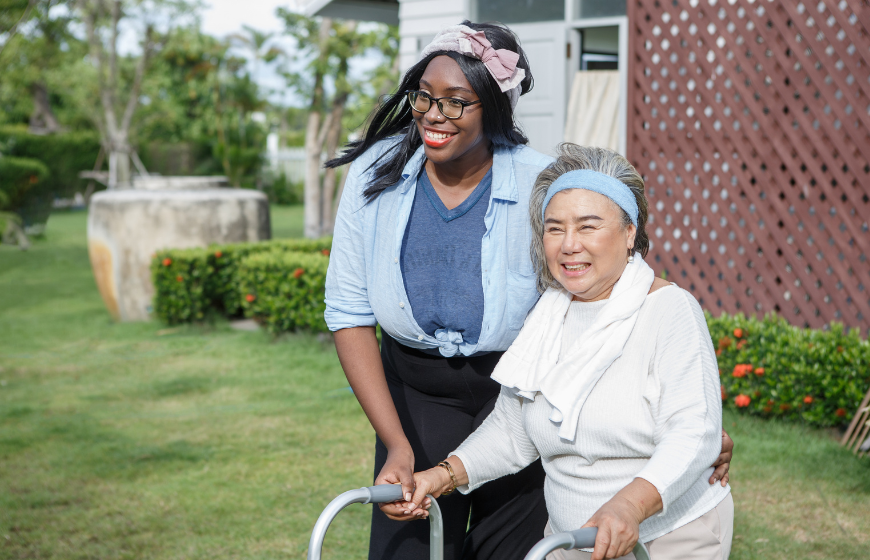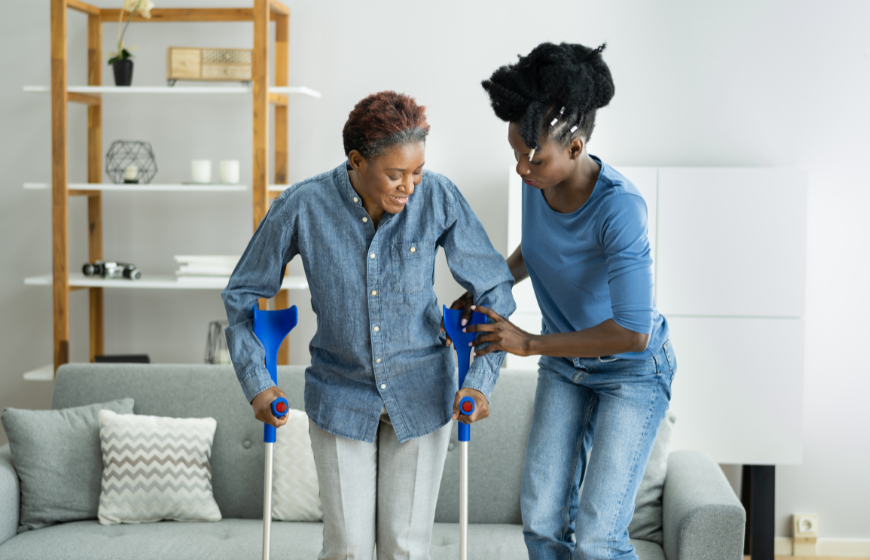Defining Parkinson’s Disease
Parkinson’s Disease is a neurodegenerative disorder that affects movement and can cause tremors, rigidity, and difficulty with coordination and balance. As people with Parkinson’s experience varying differences in their symptoms, specialized care is required for the best outcomes and quality of life.
Some of the signs and symptoms of Parkinson’s include tremors, typically seen as rhythmic shaking in the hands, fingers, or other parts of the body. Slowness of movement, known as bradykinesia, can make everyday tasks more challenging. Muscle stiffness, or rigidity, can lead to a feeling of tightness and discomfort. Additionally, individuals with Parkinson’s often experience postural instability, making them more prone to falls. Changes in gait and balance are common, leading to a distinctive shuffling walk and stooped posture. Non-motor symptoms of Parkinson’s are also prevalent and may include mood disturbances, such as depression and anxiety, sleep disturbances, cognitive impairment, and autonomic dysfunction, affecting functions like blood pressure and digestion. As the disease progresses, these symptoms may become more pronounced, making early diagnosis and management crucial for maintaining a better quality of life for those affected by Parkinson’s Disease.
Is Parkinson’s Hereditary
While genetics is not the only cause of Parkinson’s Disease, there is strong evidence that some cases are hereditary. John Hopkins Medicine reports that “about 15 percent of people with the disease have a family history of the condition.”
According to the Parkinson’s Foundation, genetics, environmental factors (like exposure to pesticides, herbicides, and industrial pollution), and lifestyle influences (like caffeine, smoking, and exercise) all contribute to a person developing the disease.
Genes Contributing to Parkinson’s Disease
While there still may be undiscovered genes that contribute to Parkinson’s, multiple resources state the most common are SNCA, PARK2, PARK7, PINK1, LRRK2, GBA, PRKN, and VPS35.
The first genetic connection to Parkinson’s was made by the National Human Genome Research Institute (NHGRI) and the National Institutes of Health (NIH). In 1997, scientists discovered mutations in the SNCA gene were “responsible for a significant portion” of family-related Parkinson’s Disease with early onset.
LRRK2 mutations, which can be found in one to two percent of cases, are more likely to result in Parkinson’s when the individual is of Ashkenazi (Eastern European) Jewish and North African Berber descent.
The most commonly found genetic mutation related to Parkinson’s Disease are GBA mutations. This mutation is likely to increase the risk of Parkinson’s after SNCA or LRRK2.
Finally, the PRKN gene variant is most commonly associated with young-onset Parkinson’s, according to Parkinson.org.
In conclusion, while various genes have been associated with Parkinson’s Disease, it’s important to emphasize that the presence of these gene mutations does no’t guarantee the development of Parkinson’s in all cases. Additionally, not everyone with a gene mutation for Parkinson’s will necessarily display symptoms. This underscores the need for ongoing research to better understand the precise relationship between genetics and Parkinson’s. Genetics play a pivotal role, both as contributing factors and potential risk markers, but the full complexity of the disease is still under investigation.
Genetic Testing for Parkinson’s Disease
Genetic testing has made it possible to identify gene mutations linked to Parkinson’s Disease. While these tests are groundbreaking, they do not provide a definitive diagnosis of Parkinson’s. As Parkinson.org highlights, genetic testing can help estimate the risk of developing Parkinson’s, but it cannot predict the likelihood of actually developing the disease. So, even if your genetic testing indicates the presence of the genetic mutations mentioned earlier, it does not guarantee that you will ultimately develop Parkinson’s.
And with the rise of genetic testing, genetic counseling is coming into the spotlight. Counseling helps navigate the emotional and psychological challenges of understanding one’s genetic risk. It emphasizes that while genes might hold specific pieces of the puzzle, they indeed don’t dictate the entire narrative of our health and lives.
Environmental Factors Leading to Parkinson’s
Genetics alone are not the sole determining factor; environmental influences can also play a role in potentially triggering the disease. It could come from long-term exposure to agricultural chemicals (pesticides and herbicides), industrial chemicals (heavy metals, detergents, and solvents), Vietnam-era exposure to Agent Orange or even head injuries in some cases. However, medical experts cannot confidently identify a specific environmental trigger for Parkinson’s Disease.
Similarly, other studies show an association between lifestyle factors and Parkinson’s. For example, moderate alcohol consumption and regular physical activity could reduce the risk of Parkinson’s, while smoking increased the risk.
Support and Care for Parkinson’s
The Parkinson’s Foundation serves as a crucial lifeline for individuals grappling with Parkinson’s Disease. They offer an array of support systems, encompassing educational resources, a dedicated helpline for tailored guidance, support groups, and community events aimed at nurturing meaningful connections. The foundation plays an active role in funding groundbreaking research, facilitating access to specialized healthcare, championing wellness initiatives, and advocating for policies that benefit the Parkinson’s community.
As a Parkinson’s Foundation Community Partner, we are committed to providing expert in-home care for Parkinson’s Disease. We feel it’s crucial for everyone who might touch a life affected by Parkinson’s to understand their unique situation so 100% of our staff have completed the required training for the partnership. When family members want to learn more about the care program or need an update on their loved one, they can rest assured they’re always speaking to someone who has in-depth knowledge about the particulars of Parkinson’s Disease. If you are in need of in-home care for yourself or someone with Parkinson’s and would like to know more about Parkinson’s Disease Home Care, please call us at 646-989-3936.
We are proud to be New York’s premier home health care agency, seamlessly facilitating the transition to in-home care for over 15 years. Contact our experienced care team today to start getting your loved one the care they deserve, or learn more about our available home care services here.




